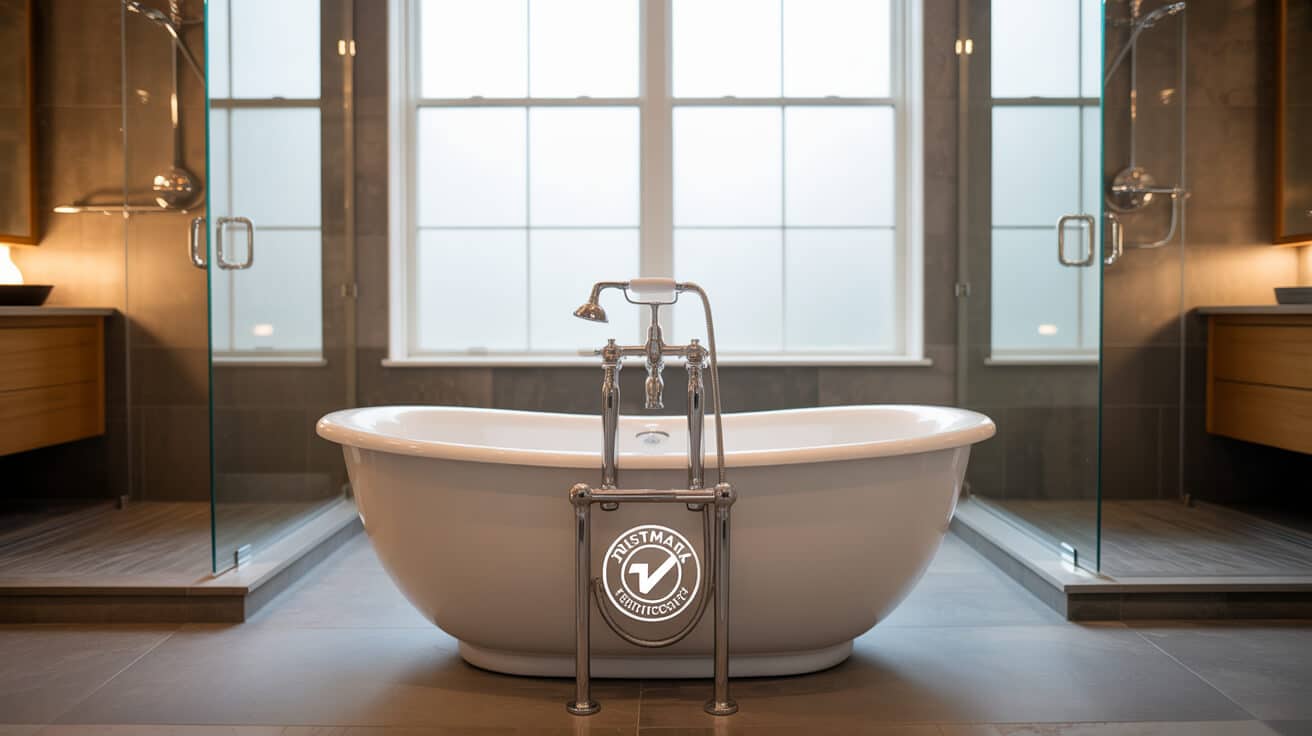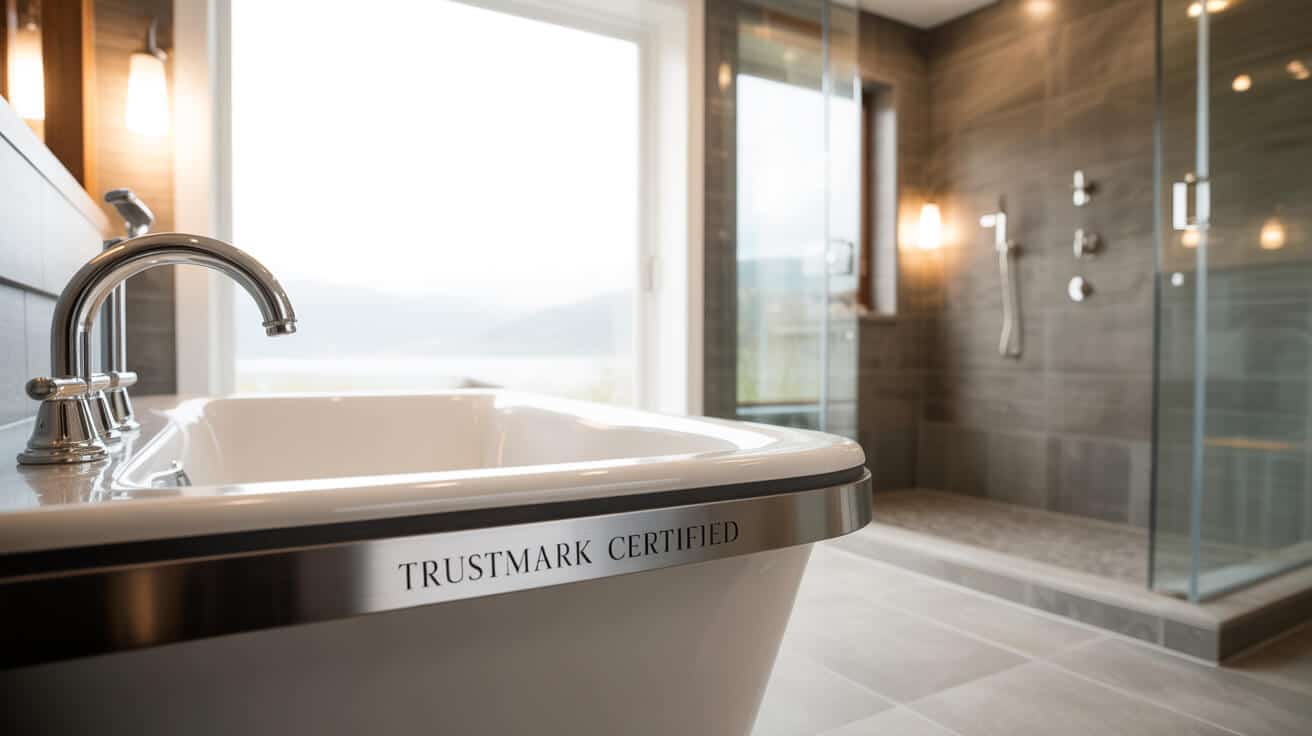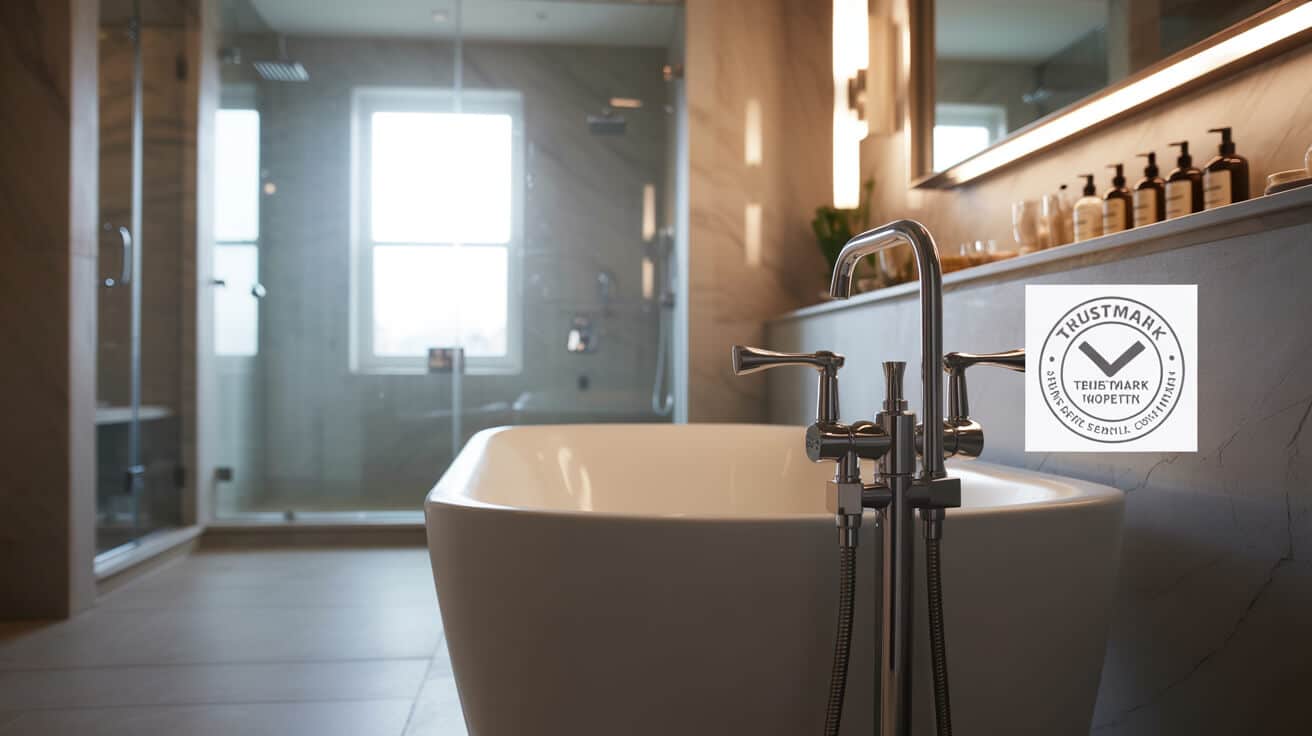From small local trades to national service providers such as Plumbers 4U, certification under TrustMark functions as a mark of assured quality and eligibility, often essential for public sector and grant-funded work.
TrustMark is recognised across the United Kingdom’s built environment as a symbol of verified trade competence, offering legal and reputational protection for plumbing and heating works. Operating within an established regulatory structure, it integrates technical compliance, insurance, and customer dispute resolution into its framework. Whether your objective is risk mitigation, regulatory alignment, or improved service procurement for your organisation, TrustMark status offers practical tools to meet both mandatory and discretionary standards in the plumbing and heating industry.
Etymology or name origin
The term “TrustMark” originates from early 21st-century government and industry collaborations to create a universally recognisable indicator of trade reliability, professionalism, and consumer protection. The combination of “trust” and “mark” was chosen to inspire user confidence at a glance, reducing uncertainty associated with selecting home improvement or repair professionals. The nomenclature has since become embedded in the sector’s operational and marketing lexicon, influencing both consumer perceptions and your company’s brand architecture.
Overview and context
The United Kingdom’s plumbing and heating sector has evolved rapidly in response to increasing expectations for safety, performance, and regulatory oversight. Diverse in scale, ranging from sole practitioners to major service brands, companies operating in this space have historically faced challenges such as unqualified competition, variable workmanship, and inconsistent consumer satisfaction.
Systematic certification was introduced to create structured accountability and reduce risks for your business or property. Initiatives like TrustMark emerged as a direct response to persistent service gaps, equipping stakeholders—homeowners, landlords, property managers, facilities directors—with practical mechanisms to verify competence, monitor compliance, and escalate complaints. Professional associations, customer watchdogs, and government regulators play ongoing roles in supporting this infrastructure, ensuring your needs are addressed within a controlled, continuously improving framework.
History
Origins
TrustMark was conceived in 2005, during a period of heightened scrutiny over home renovation and maintenance practices. Various scandals involving rogue traders and unregulated work propelled both government agencies and professional organisations to seek robust solutions for public protection.
Industrial emergence
Plumbing and heating, along with electrical and roofing trades, were identified as priority industries for initial scheme rollout, given the potential for significant economic loss, property damage, and personal injury in the absence of verified skills and regulatory adherence. Early pilot programmes, often involving companies like Plumbers 4U, established foundational processes and assessment criteria, emphasising both competency and transparent business practices.
Contemporary evolution
Through the 2010s and into the 2020s, TrustMark expanded its reach to align with government-driven funding programmes, notably the Energy Company Obligation (ECO4) and Green Homes Grant. Enhanced requirements for digital recordkeeping, continuing professional development (CPD), and consumer redress mechanisms have been introduced. The COVID-19 pandemic and renewed focus on decarbonization have further accelerated digital adoption and procedural rigour across the sector.

Concept and certification description
Definition and structure
TrustMark operates as a voluntary accreditation mark, licenced by UK government, and managed through a network of approved scheme providers. Each provider, such as Plumbers 4U, implements rigorous vetting protocols including pre-admission checks, ongoing auditing, documented insurance, and CPD tracking.
Core certification criteria
Applicants must demonstrate:
- Full compliance with sector regulations (including Building Regulations Parts G, H, L)
- Proven insurance, deposit protection, and customer warranty structures
- Documented systems for complaints, dispute mediation, and rectification
- Evidence of technical qualifications, staff training, and adherence to codes of practice
Renewal and ongoing obligations
Certified status is conditional on continued performance:
- Regular audits (often scheduled, sometimes unannounced) assess technical execution, recordkeeping, and customer feedback outcomes
- CPD and revalidation may be required annually or upon major regulatory change
- Failure to remediate non-conformance can result in suspension or de-listing from the TrustMark register, jeopardising access to public sector contracts and funding
Functionality, purpose, and applications
Work covered
TrustMark covers a range of plumbing and heating activities, including:
- New system installations (domestic/commercial)
- Upgrades or retrofits (energy saving, renewable integration)
- Responsive maintenance and repairs
- Scheduled inspections, safety testing, and insurance compliance
- Emergency callouts and disaster remediation
Intended outcomes
For your company, the scheme provides a recognised, marketable quality credential essential for accessing regulated work streams and grant funding. For your property or business, TrustMark offers protection mechanisms including insurance-backed warranties, rapid complaints escalation, and recourse to third-party dispute mediation.
Practical scenarios
- A property manager using TrustMark to pre-qualify vendors for a framework agreement
- A homeowner verifying credentials for a bathroom upgrade
- A landlord ensuring eligibility for ECO4-backed renovations
- A facilities director implementing continuous quality assurance on an estate
Classifications and types
Eligible companies and technicians
TrustMark is open to a wide array of providers:
- Independently owned plumbing businesses and regional SMEs
- National providers specialising in large-scale or multi-site contracts
- Specialist contractors in high-risk or heritage domains
- Individual technicians who operate within larger organisations but meet all training and assessment standards
Scope of activities
Covered work typically includes:
- Water supply and management, including hot and cold systems
- Heating solutions, including central heating, underfloor heating, and hybrid systems
- Controls integration (digital thermostats, app-based management)
- Maintenance, cleaning, and emergency leak response
- Energy systems integration (solar thermal, air-source heat pumps)
Multi-scheme and regional variants
Companies frequently participate in complementary schemes (e.g., Gas Safe, WRAS, WaterSafe) for full-spectrum compliance, particularly where mixed system coverage or grant eligibility is needed. Some devolved administrations may impose additional requirements or deliver adapted pathways based on local building or housing codes.
Systems, tools, and methodologies
Public register and verification
TrustMark maintains a digital register available to your organisation, providing real-time search and validation for company, individual, or job-specific credentials. Each entry details scope of work, audit status, any restrictions, and information concerning complaints or remedial actions.
CPD and audit documentation
Scheme operators require robust documentation support, with most providers maintaining internal portals for capturing training, insurance, incident reporting, and compliance tracking. Regular uploads and third-party verifications are standard, driven by random or risk-based audit algorithms.
Complaints management and mediation
A dedicated portal facilitates complaints submission, handling of escrow or deposit disputes, and consumer queries. All companies, small or large, must demonstrate not only that your complaints process is in place, but that it is responsive and subject to external oversight if escalation is needed.
Data protection and digital security
The rising focus on digital systems has brought corresponding demands for robust data governance. TrustMark mandates that registered entities safeguard your personal data, restrict access, and operate within the bounds of UK/EU data privacy codes.

Stakeholders and involved entities
Government and oversight
TrustMark is licenced and continually monitored by the Department for Energy Security and Net Zero (DESNZ) and related public agencies. The TrustMark board, comprised of independent and stakeholder directors, sets policy, resolves high-level complaints, and convenes technical and legal advisory panels.
Scheme operators and partners
Operators—accredited professional associations and independent bodies—serve as assessors, industry liaisons, and onboarding support, ensuring your company meets requisite standards throughout the certification lifecycle.
Inspectors, auditors, and third-party evaluators
Sector-agnostic auditors and subject matter experts are embedded in the process to guarantee objective quality assurance. Escalated complaints or ambiguous cases may be reviewed by an ombudsman or quasi-judicial panel.
Companies, contractors, and trading brands
Each certified company, such as Plumbers 4U, is expected to uphold scheme values in your own commissioning and service criteria, with supply chain or subcontractor relationships also subject to potential vetting. Technicians, supervisors, and customer-facing teams are front-line contributors to the living culture of TrustMark compliance.
End users and institutional customers
Stakeholders include your organisation as a commissioning client, your property manager, and your customer base, as well as consumer advocacy groups, trade unions, and public management teams.
Legal, regulatory, and ethical considerations
Relevant legislative structure
TrustMark’s remit intersects with several statutory domains:
- Building Regulations (including Parts G, H, L) specify design, installation, safety, and energy efficiency benchmarks
- Water Supply (Water Fittings) Regulations 1999 and local authority enactments
- Gas Safety (Installation and Use) Regulations 1998 for gas-related competencies
- Landlord and Tenant Act implications for annual certification, complaint handling, and redress standards
Duties for registered and prospective companies
Your company must always provide:
- Evidence of valid and sufficient insurance coverage
- Transparent workflow and contract documentation for customers
- Annual self-certification and random external audit response capabilities
- Active complaints management and clear result documentation
Grant linkage and eligibility
Most UK property and energy grant schemes, including ECO4 and the Boiler Upgrade Scheme, require TrustMark as a threshold credential for payment, compliance audit, and periodic reporting.
Data stewardship and public information
TrustMark’s legal obligations extend to accurate register publication, timely information updates, and protection of customer data. Breaches can result in financial penalties, reputational loss, or disqualification.
Performance measurement and data
Company and sectoral analytics
TrustMark aggregates audit, complaint, and customer satisfaction data to support both continuous improvement initiatives and annual public reporting. Your company’s data quality influences eligibility for new accreditations, funding, or public sector tenders.
| Performance Indicator | Description | Stakeholders Benefiting |
|---|---|---|
| Audit Pass Rate | % of successful company audits | Property managers, public bodies |
| Complaint Resolution Time | Avg. days to close escalated complaint | Homeowners, landlords |
| CPD Completion | % of technical staff current on CPD | Company owners, contractors |
| Insurance Validity | Active, lapsed, or unverified | Your company, customers |
| Funded Project Eligibility | Proportion of projects meeting “grant ready” | Facilities, councils, landlords |
| Public Register Accuracy | Real-time consistency with scheme status | All audiences |
Feedback and escalation
The complaints and redress process is independently monitored, and company performance is benchmarked both publicly and in aggregate, feeding forward to ongoing scheme reform.
Challenges and limitations
Operational issues
Complying with TrustMark requirements involves time, cost, and administrative intensity, which can disproportionately impact SMEs and sole traders. Some work categories—especially complex repairs or innovative installations—may not fit seamlessly within certification templates, forcing customised compliance pathways.
Barriers for users and organisations
Awareness is not fully universal even among eligible customers. Differentiation between TrustMark and overlapping trade schemes can cause confusion for your company or property manager assessing eligibility or contract scope.
Other barriers include:
- Geographic imbalances in certified provider distribution
- Specific legal liabilities and indirect costs linked to scheme participation
- Perceived bureaucracy, especially for companies focused on rapid, reactive repair work
Sector criticisms
Industry commentary sometimes highlights a lack of enforcement powers, incomplete audit coverage, and an over-reliance on self-declaration or desk audits. Trade associations and watchdogs continue to monitor and lobby for iteration and improvement, ensuring your perspective is considered in future reforms.
Sector influence and legacy
Elevating standards
Certification has driven an uplift in standards of technical execution, customer service, and business transparency. For your company, documented compliance is a competitive factor in both private procurement and public framework tendering.
Impact on professionalism and training
TrustMark’s data-driven ecosystem compels ongoing engagement with technical upgrades, legal shifts, and customer experience optimization. The scheme has contributed to a culture of continual learning, with technical knowledge and well-defined complaint protocols increasingly expected.
Property sector and public buyers
Major property companies, asset managers, and public authorities have fast-tracked implementation of TrustMark specification as a precondition for framework participation. Homeowners and landlords more routinely check credentials, improving outcomes and reducing disputes.
Future directions, cultural relevance, and design discourse
Regulatory and grant developments
Anticipated changes in building legislation, increased requirements for carbon reduction, and the emergence of “smart” regulation will continue shaping the TrustMark landscape. Integration with digital verification systems, integration of renewable systems (solar, air source, thermal), and mandate extensions are all topics in ongoing policy discussions.
Digitalization and consumer tools
Public registers and real-time verification tools will deepen your ability to select qualifying partners. Data-driven outcomes, transparent performance dashboards, and streamlined complaint management are set to become industry mainstays.
Cultural and psychological shifts
As TrustMark consolidates its status as a benchmark of reliability and transparency, consumer and operator perceptions of quality will continue to evolve. Your usage and engagement patterns as a stakeholder reinforce this culture, influencing the future face of standards, safety, and service in UK plumbing and heating.

